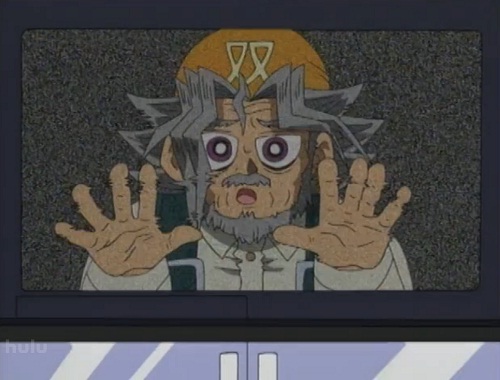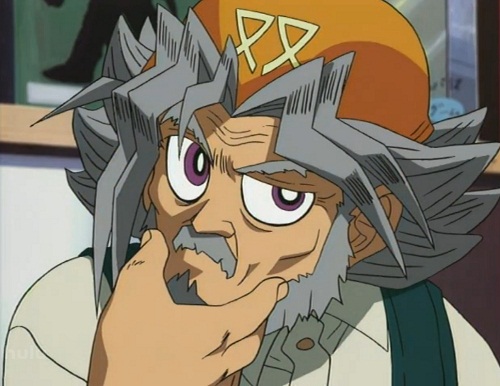Licensing agreements are usually kept top secret for business reasons. That is, until one company (allegedly) breaches the agreement and then goes bankrupt. At that point the court system takes over and the dirty laundry become public. That is exactly what happened when 4Kids got Yu-Gi-Oh! from TV Tokyo.
The upshot of the fighting is that anime fans get a backstage pass to see what an important license contract says. The language of this contract helps explain why, how, and in what form anime is released outside of Japan. Here I’ll discuss form, namely why 4Kids had the right to butcher Yu-Gi-Oh!. The short answer: TV Tokyo said they could.

TV Tokyo didn’t give 4Kids carte blanche permission to make changes to the show, but it made changes pretty easy to do. The license lets 4Kids “… dub each Episode and any Additional Episode as determined by 4Kids in 4Kids’ discretion and to otherwise edit and adapt each Episode and any Additional Episode to make each episode suitable for broadcast in the various countries throughout the Territory.”
This language seems to give 4Kids the right to make whatever edits it wants. The contract goes on to let TV Tokyo review the changes and submit objections to 4Kids. This process was only added to the second agreement between the companies, signed in 2008. But this power is more or less eviscerated in the next sentence: “4Kids shall use reasonable commercial efforts to make a ‘running change’ in any future English language adaptations of Additional Episodes not yet completed (emphasis added) by 4Kids to address the objections of Licensor.” In other words, once 4Kids butchers an episode there is no going back. TV Tokyo’s only option is to make objections before episodes are aired.

Why did TV Tokyo give 4Kids so much control? It is possible that TV Tokyo maintained stricter control in practice. But if this is true, TV Tokyo should have modified the second agreement to reflect what was really happening. Instead, they saw what a bad job 4Kids did with the show and let them continue ruining it. I think TV Tokyo viewed Yu-Gi-Oh! mainly as a vehicle to sell profitable merchandise such as toys. If that is the case, the authenticity of the American version might not have mattered to them. As long as the money from 4Kids came in, the company could do what they wanted. TV Tokyo only got mad, and sued, when the money stopped flowing.
What does this arrangement say about the control Japanese companies exercise over American adaptations in general? Maybe little. Anime companies might exert more control over series that weren’t designed to sell toys. Or they might care even less about shows that are meant for mature audiences but are less profitable. Just looking at what happened with Yu-Gi-Oh!, I’d guess they don’t care about fidelity as long as they get their money.
How many lawyers does it take to screw up an anime series?
7 responses to “How many lawyers does it take to screw up an anime series?”
-
It is awesome to see you combine your lawyerly skills and your love of anime. I have to ask though, do you think TV Tokyo really understood what 4Kids was doing to the show re: localizing? I kind of doubt they did. It would require a lot of subtle (well… okay, I use the word loosely) English comprehension on their part, and (Brooklyn) accents especially fall on deaf ears, in my experience with Japanese speakers. And that’s if they even bothered to watch it at all.
Besides, without the 4Kids dub, there would be no Yu-Gi-Oh! The Abridged Series, and then where would we be?
I think that your ultimate point about it being about the money is true. The only way for YGO to make boatloads of money was for it to be targeted at the young boys who would play the card game and buy the toys. Authenticity probably didn’t enter into it. And look what happened when 4Kids and Funimation released uncut DVDs… nobody bought them.-
Thanks, I should probably rename myself Phoenix Wright ace attorney and really complete the law/anime pairing.
Yah, I really don’t think TV Tokyo cared. And you could argue they didn’t need to, it’d be like worrying about the french translation of the garfield cartoon. I just wanted to point out that while 4Kids gets blamed (rightly) for ruining a number of shows, the Japanese companies are usually let off the hook. I think they deserve as much creditas 4Kids for killing Yu-Gi-Oh!.
As for no one buying the uncut version, maybe at that point too much time had passed and it was too late.
-
-
Isnt this what happened to One Piece? Its awesome in subs but once 4Kids dubbed it, its popularity in America plummeted.
-
I happen to work in the industry and, at least in my country, companies rarely excercise any kind of control over the final dub of their shows. With high-profile shows or series tied to toy/etc. franchises they usually want to approve voices and translations, and they can be very, very thorough about it (I have a cartoon for which we’ve been doing the voice casting for months), but I’ve never heard about stopping the dubbing process of a show on the grounds of the dub being bad. (I’ve heard of exactly one case of redubbing a series because fans didn’t like the dub: it was a Star Trek series, with a franchise image and popularity that anime will never have outside Japan.)
Basically, yes, ultimately they care only about the money, especially if the anime is essentially a commercial for toys (as Pokemon, Digimon, YGO, etc. all are). Anime is, after all, a business. Dubbing is not cheap, there’s no time to review and judge every single episode before they air, besides, they can’t really judge what works in a different cultural context and what doesn’t, so they tend to just assume that the local contractor knows what they’re doing – after all, it’s in their best interest as well. And if it doesn’t work, well, there’s no point in trying to “fix” a ruined franchise image. This sucks for fans, but again, fans need to understand that nobody wants to ruin a show. 4Kids wanted to create a dub that would make YGO successful with their target audience – it didn’t work.-
Forgot to add: local contractors may of course excercise quality control over the dubbing studios, but this is only between the two of them.
Also, as for anime – back in the day I used to translate anime and among other series, I worked on a rather high profile show (one of Shounen Jump’s big three). There was no need to get anything approved about the translations, and as far as I’m aware there was no special casting either. All the control I had was a guy at the TV channel, and only because he happened to care. So there’s that. -
I find it interesting that the company had time to review the script, but not the dub. But reviewing the script is worthless if you can’t make changes. That’s what I thought stunk about the Yu-Gi-Oh! license, TV Tokyo reviewed the script but ultimately 4Kids didn’t need their approval to move forward. Do the anime companies you work with actually approve the scripts or just review them?
As for the time crunch, if the companies have time to take months to cast voices they should have time to review the shows themselves. It’s not like the dubs are getting simulcast.-
I’m not familiar with this case, but in my experience reviewing and approving pretty much means the same: as the contract writes, TV Tokyo reviews the scrips and may submit objections based on their evaluation. Also, this should happen before recording, so any changes the client makes will carry on to the dub itself. (Note though, that I don’t work with anime companies – for better or for worse!)
Re: casting, note that it’s rare that casting goes on for more than a couple of weeks. The months-long casting I mentioned is seriously abnormal (and reflects pretty well on the amount of hopes the client has for the show…). Also, as I mentioned above, there was no script reviewing and AFAIK no casting either for anime series that are pretty damn popular in Japan and elsewhere (re: Shounen Jump, also one of the more popular NoitaminA shows)… take this as you will.
Also, as the client, no matter how paranoid you are about quality, you pretty much have to draw the line somewhere. Even if you do casting, review/approve the scrips – for the rest you pretty much have to trust the dubbing studio (or the local licensor, if they’re the ones who order the dub) to get the rest right. Think about it, TVTokyo would have to get someone to sit down and watch the dub of every single episode of every one of their series that get dubbed (and get people to do this for all languages!), and decide, at their own discretion, how the audience will react. Maybe they do this with some shows – I don’t know, but to me it sounds pretty impossible, also a waste of money, to do this on such a huge scale. I mean, TVTokyo has no idea what will sell in, say, the US, they have to trust the American licensor on that.
Now, the local licensor (whoever orders the dub from the dubbing studio) may and often does perform quality check before an episodes airs (at least over here). However, this is usually restricted to mispronounciations, mistranslations, technical errors and such – if a show requires special treatment in any way the licensor will let the dubbing studio know before production of the dub begins. In this case 4Kids was the licensor, so even if they did QC on the dubbed episodes they pretty much got what they wanted.
-
-

Leave a Reply